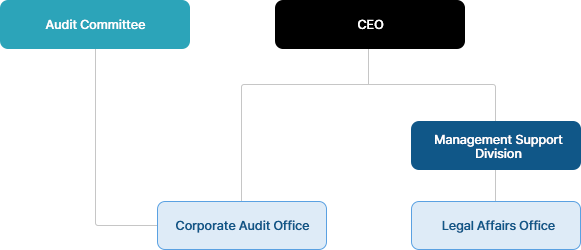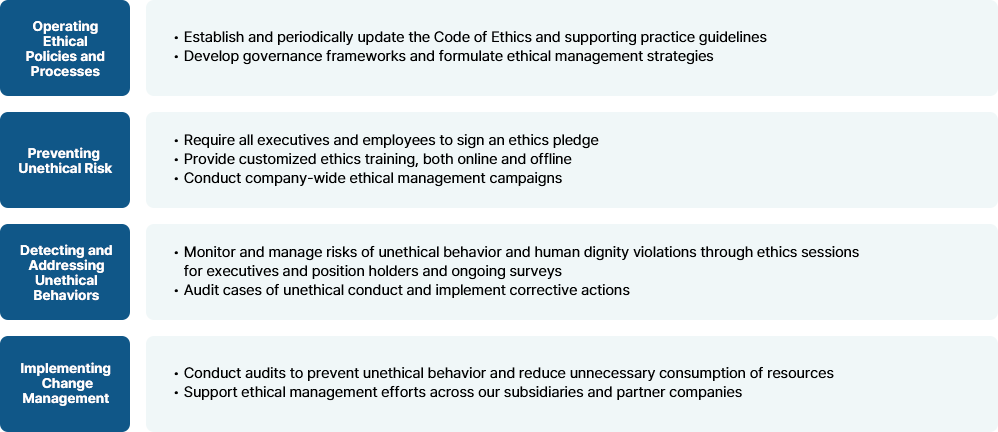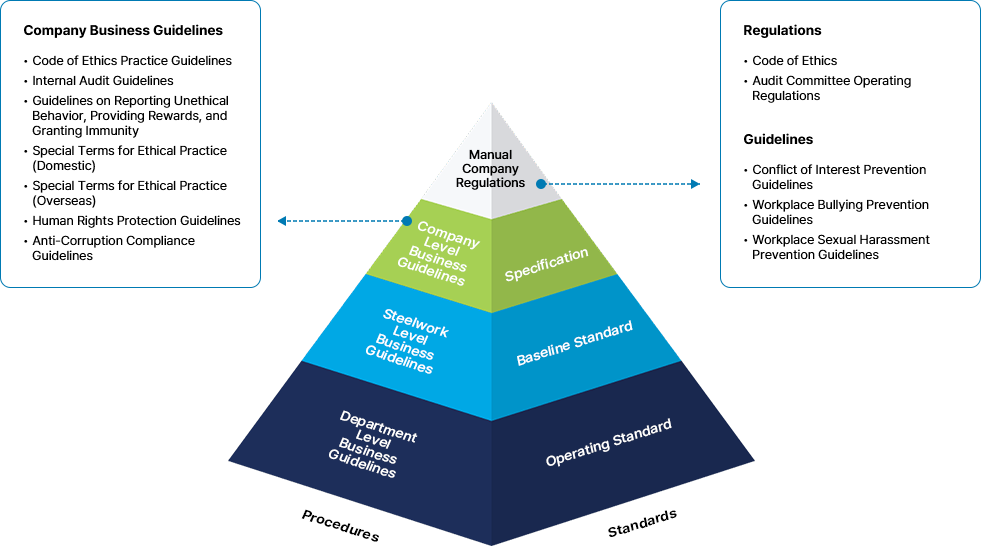Ethical Management
Organization
Audit Committee
Operational Status
Management Directives
Ethical Management Process
Ethical Standards and Policies
Ethical Management Standard Operating Framework
Ethics Training and Pledge
| Program | Target | Frequency |
|---|---|---|
| Ethics Training | All executives and employees (including contingent workers) | Once a year |
| Ethics Pledge | All executives and employees (including contingent workers) | Once a year |
| Executives’ Ethics Pledge | All executives | Once a year |
|
Ethics Dialogue |
All executives |
Once a year |
POSCO provides both online and offline training programs to all executives and employees, across domestic and international sites.
“Understanding POSCO’s Ethical Management” is a mandatory e-learning course based on real-world counseling and audit cases, required for all executives and employees. We also run monthly ethical management campaigns that offer practical guidance on resolving ethical dilemmas and addressing workplace harassment. These materials are distributed throughout the Group. Upon request from customer-facing and procurement departments, we also deliver tailored training sessions based on actual unethical conduct cases to help reduce workplace risks. To support global operations, we share English-language campaign content with our overseas subsidiaries.
| Online | · Providing mandatory e-learning courses (“Understanding POSCO’s Ethical Management” and “Preventing Workplace Sexual Harassment”) · Company-wide posting of ethics campaign materials on unethical behavior, bullying, sexual harassment, and abuse of power · Distributing campaign resources through the Global Information Hub (GIH) system |
| Offline |
· Training by corporate hierarchy and grade: Deliver separate programs for distinct employee groups, including: - Executives, position holders, and expatriates - New and experienced hires, and interns - Overseas local hires · Department-specific training: Offer case-based, in-depth sessions for departments engaging with external stakeholders, such as the Raw Materials Office, Investment Planning and Engineering Office, and Marketing Division · Special training on sexual ethics: Conduct targeted training on sexual ethics compliance for mid-tenure employees (5,073 participants across 35 sessions), with external experts serving as lecturers * Executives and position holders are required to receive PIUM training every year. |
Risk Management
· Four Policies: (1) Code of Ethics, (2) Conflict of Interest Prevention Guidelines, (3) Workplace Bullying Prevention
Guidelines, and (4) Workplace Sexual Harassment Prevention Guidelines
· Five Practice Guidelines: (1) Code of Ethics Practice Guidelines, (2) Anti-Corruption Compliance Guidelines,
(3) Human Rights Protection Guidelines, (4) Guidelines on Reporting Unethical Behavior, Providing Rewards, and
Granting Immunity, and (5) Special Terms for Ethical Practice
Our Code of Ethics broadly defines “money and goods” to include anything of economic value. It explicitly prohibits executives and employees from providing, requesting, or accepting unjustified money or goods from stakeholders under any circumstances.
The Anti-Corruption Compliance Guidelines define “bribery” as any improper behavior that results in obtaining, or enabling a third party to obtain, tangible or intangible benefits—including assets, positions, or opportunities—through illegal or inappropriate means in connection with business activities. In cases where a conflict arises between POSCO’s internal policies and domestic or international anti-corruption laws, local regulations, or related company rules such as the Code of Ethics, the strictest standard shall apply.
Diagnostics and Measures
| Executive Ethics Session | Assess ethical awareness among executives (annually) |
| Position Holders’ Ethics Session |
Enhance ethical leadership among position holders (annually) |
| Ethical Risk Detection Survey |
Identify unethical business practices and human dignity violations, such as sexual harassment and workplace bullying (monthly) |
Unethical Behavior Reporting Center
POSCO runs a reporting center where employees can report unethical behavior and human dignity violations. Our Corporate Audit Office handles unethical behavior reports, while the Human Rights Center manages reports concerning human respect violations. Both oversee the entire process, from receipt of a report to follow-up actions, and makes sure that every case is investigated. In 2023, we expanded our language input services from Korean and English to include Chinese, Spanish, Vietnamese, and Turkic languages. This expansion allows global employees in our overseas operations to submit reports in their native language.
Any stakeholder can seek consultation or submit reports. We strictly prohibit any actions that could reveal their identity during the consultation and reporting process. Furthermore, employees of the Internal Audit Department take the Auditor Security Pledge at the beginning of each year to ensure the identity of users is protected. The operating procedures for report investigation, including ensuring the confidentiality of reports, are set forth as guidelines in Chapter 3 of the Public Interest Whistleblower Protection Act, which is applicable to private companies (Guidelines for Rewarding and Providing Immunity for Reports on Unethical Behavior).
In addition, POSCO is fostering a transparent corporate culture by requiring employees to record and manage solicitations received from third parties in the Clean POSCO System.
In 2024, a total of 418 reports of unethical behavior were received and processed through the Reporting Center.
Report Handling Procedure
Measures for Unethical Behavior
Change Management
Support for Partner Companies in Establishing Ethical Management Systems
Metrics and Targets
Performance
Completion Rate of Ethics Training Programs
| Category | Unit | 2020 | 2021 | 2022 | 2023 | 2024 | 2025 Goals |
|---|---|---|---|---|---|---|---|
| Completion Rate of Ethics Training Programs |
% | 99.9 | 100 | 100 | 100 | 100 | 100 |
Filing of Unethical Behavior Reports
| Category | Unit | Irregularity | Human Dignity Violation |
Abuse of Power | Other | Total |
|---|---|---|---|---|---|---|
| Filing of Unethical Behavior Reports |
Case | 119 | 107 | 21 | 171 | 418 |




